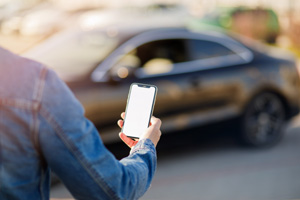
The rise of rideshare companies like Uber and Lyft has made transportation more convenient, but it has also raised complex legal questions about liability in the event of an accident. When an accident involves a rideshare driver, one critical element to consider is the driver’s “working period” at the time of the incident. Understanding which phase the driver was in during the accident can significantly impact your ability to file a claim and who may be held responsible. In short, rideshare drivers operate under distinct working periods, and these periods directly affect liability in a legal case.
At Rubin, Glickman, Steinberg & Gifford, P.C., we understand navigating a rideshare accident claim can be overwhelming, especially when multiple parties and complex insurance policies are involved. We may be able to help you sort through the confusion and determine the best legal approach for your case. Our talented attorneys have decades of experience handling personal injury claims in Southeastern Pennsylvania, and we are committed to protecting your rights every step of the way.
What Are Rideshare Working Periods?
Rideshare working periods are essentially the phases a driver goes through while using the rideshare platform. Understanding these phases is essential, as they play a crucial role in determining which insurance coverage applies after an accident. There are generally three distinct periods:
- Period 1: The driver is logged into the rideshare app but has not yet accepted a ride. In this phase, the driver is technically on duty but is not actively transporting or picking up passengers.
- Period 2: The driver has accepted a ride request and is on the way to pick up the passenger. During this time, the rideshare company typically offers more extensive insurance coverage compared to Period 1.
- Period 3: The driver is transporting a passenger. This is the most protected phase for both the driver and the passenger, as rideshare companies provide higher insurance coverage when a passenger is in the vehicle.
Each of these periods comes with different levels of insurance protection provided by the rideshare company and the driver’s own policy. This distinction is crucial because it determines whether the company’s insurance policy will cover damages or if you will need to pursue compensation through other means.
How Do Working Periods Affect Liability?
Rideshare companies are known for the complex nature of their insurance policies, which vary depending on the working period. These policies directly affect who may be held liable and how much compensation is available in the event of an accident. During Period 1, when a driver is logged into the app but not actively working, the rideshare company’s insurance coverage is minimal. In some cases, the company may provide only limited liability coverage, often leaving the driver’s personal insurance responsible for the bulk of the claim.
During Period 2 and Period 3, however, the company’s insurance policies usually offer more substantial coverage. For instance, while the driver is on their way to pick up a passenger (Period 2) or has a passenger in the vehicle (Period 3), the company generally provides significant liability coverage, often up to $1 million. Understanding these details can make a difference in how much compensation you can recover after an accident.
Moreover, if the accident occurs during Period 1, you may need to rely on the driver’s personal insurance, which can introduce additional complications. Some personal insurance policies exclude coverage for accidents occurring while the driver is using their vehicle for commercial purposes, leaving victims with fewer options for compensation.
Who is Liable in a Rideshare Accident?
Determining liability in a rideshare accident often involves multiple parties and can be a complex legal process. The driver’s working period at the time of the accident is the first step in figuring out who is responsible. In cases where the driver was in Period 2 or Period 3, the rideshare company may be held liable because they provide higher insurance coverage during these phases.
However, if the accident occurred in Period 1, liability may rest primarily on the driver’s personal insurance. It is important to note that Pennsylvania is a no-fault state, meaning your own insurance policy may provide initial compensation for medical bills and other expenses. However, in cases where severe injuries are involved, you may have the right to step outside of the no-fault system and pursue a claim against the driver or rideshare company.
This makes it vital to gather as much information as possible after the accident, including whether the driver was actively working for a rideshare service and which phase of the working period they were in. The answers to these questions will shape the course of your claim.
How Can Rubin, Glickman, Steinberg & Gifford, P.C. Help With Your Rideshare Accident Claim?
Rideshare accidents can leave victims feeling uncertain about where to turn and what steps to take next. At Rubin, Glickman, Steinberg & Gifford, P.C., we understand the intricacies of rideshare working periods and how they affect liability in an accident. With over 270 cumulative years of experience, our talented attorneys have helped countless clients navigate these types of claims successfully. We may be able to determine the best path forward for your case so you can focus on recovering from your injuries.
Choosing a law firm with a strong track record in personal injury cases may give you a crucial advantage. Our firm has received numerous accolades, including being named a “Best Law Firm” by U.S. News & World Report for over a decade. When you work with us, we will work tirelessly to ensure you receive the compensation you deserve. Contact us today to schedule a consultation at (215) 822-7575 or visit our contact form.

Rubin, Glickman, Steinberg & Gifford P.C.
Pennsylvania Attorney's
November 7, 2024








